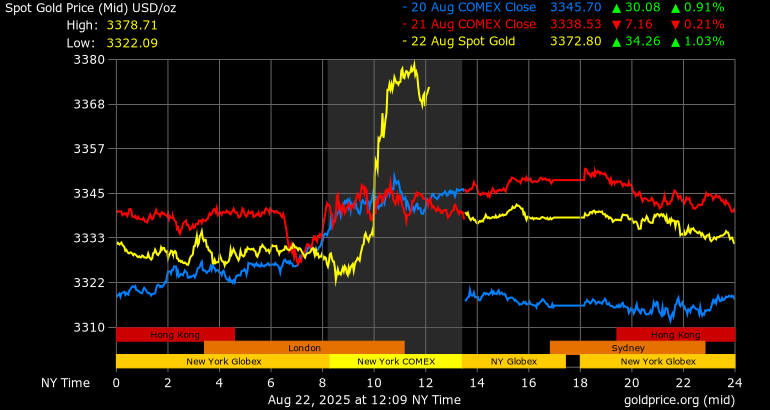Gold prices have surged to historic levels, with futures now crossing the $4,000-per-ounce mark for the first time, signaling a wave of global safe-haven demand amid heightened geopolitical tensions and expectations of U.S. interest rate cuts.
Three-month gold futures climbed as high as $4,014.60 before retreating to $3,987.50, while spot gold reached a new all-time high of $3,991 just shy of the symbolic $4,000 threshold.
New data from the Ghana Gold Board (GoldBod) reveals that gold exports hit an unprecedented US$897.6 million in April 2025 alone, marking one of the strongest months in the country’s export history.
This milestone, according to market analysts, has bolstered foreign exchange inflows and supported the Ghana cedi’s gradual recovery against major currencies.
In an interview, Sammy Gyamfi ESQ, CEO of GoldBod, described the new agency’s mission as both economic and moral.
“We are committed to transforming Ghana’s gold trading industry to optimize national benefits through responsible sourcing, value-chain traceability, value addition, and sustainability.”
Sammy Gyamfi ESQ, CEO of GoldBod
At the heart of this gold-fueled resurgence lies GoldBod the state agency created under the 2025 Gold Trade Act to centralize the country’s gold trade, regulate exports, and eliminate leakages from smuggling and underreporting.
The agency’s mandate gives it exclusive authority to buy, assay, grade, and export gold from licensed artisanal and small-scale miners, a bold step toward reclaiming value that was previously lost through unregulated trade.
Building a Transparent and Accountable Gold Market

Since its inception, GoldBod has introduced a sweeping set of reforms aimed at making Ghana’s gold sector more transparent and beneficial to the state.
Among the most notable initiatives is a nationwide traceability system, which ensures that every ounce of gold can be tracked from its source to its final sale.
The system, which integrates digital tagging and real-time monitoring, is designed to make gold smuggling far more difficult, a problem that has long undermined state revenues.
The agency has also rolled out enforcement initiatives, including the donation of five Toyota pickup vehicles and GH¢5 million to support Ghana’s anti-illegal mining task forces, underlining its commitment to the rule of law.
Moreover, GoldBod has moved decisively to suspend non-compliant licenses and block unlicensed traders, particularly foreign middlemen who have historically dominated the artisanal gold trade.
Mr. Gyamfi stated, “As of May 1, 2025, only GoldBod is permitted to lawfully trade artisanal gold,” emphasizing that the policy aims to protect both the state’s interests and small-scale miners from exploitation.
A Catalyst for Economic Recovery

Economists say that the timing of these reforms could not be better. The global gold rally, driven by inflationary fears and geopolitical uncertainty, has provided Ghana with a much-needed buffer against external shocks.
GoldBod’s centralized trading and tighter controls have already led to larger official exports and increased foreign exchange inflows, helping the country stabilize its reserves.
According to the Ministry of Finance, the gains have reduced pressure on the cedi and created fiscal space for development spending.
Beyond the macroeconomic benefits, analysts point to a deeper transformation underway. Stronger gold revenues give government greater fiscal leverage, reducing the need for excessive borrowing or monetary expansion. This, in turn, strengthens investor confidence in Ghana’s debt markets.
GoldBod’s regulatory grip is also beginning to show environmental dividends. By tightening licensing requirements and enforcing traceability, the agency is helping to curb illegal mining (galamsey), a practice that has devastated rivers and farmlands.
Under the new regime, miners must comply with environmental standards before selling to GoldBod.
This has encouraged a gradual shift toward cleaner mining technologies and sustainable practices, backed by partnerships with environmental NGOs.
The agency is also working with the Ministry of Trade to promote value addition, including gold refining, jewelry manufacturing, and local fabrication.
These efforts aim to ensure that Ghana does not merely export raw gold but builds an industrial base around its mineral wealth.
Balancing Opportunity and Risk

Despite the promising gains, experts warn that the country must manage its newfound “gold rush” carefully. Gold’s price volatility could quickly erase fiscal gains if revenues are not prudently managed.
There are also concerns about the concentration of power in a single entity. While GoldBod’s consolidation of roles, regulatory, commercial, and enforcement enhances efficiency, critics argue it must be paired with strong oversight to prevent abuse or conflicts of interest. Transparency, regular audits, and parliamentary scrutiny, they say, will be essential.
Nonetheless, the consensus remains that GoldBod represents one of the most significant governance reforms in Ghana’s extractive sector in decades.
With the global gold market booming and the country’s regulatory framework tightening, Ghana has a unique opportunity to convert short-term gains into long-term stability.
If transparency and fiscal discipline prevail, analysts believe Ghana’s current “golden moment” could indeed serve as the cornerstone for sustainable prosperity rather than another fleeting boom.























